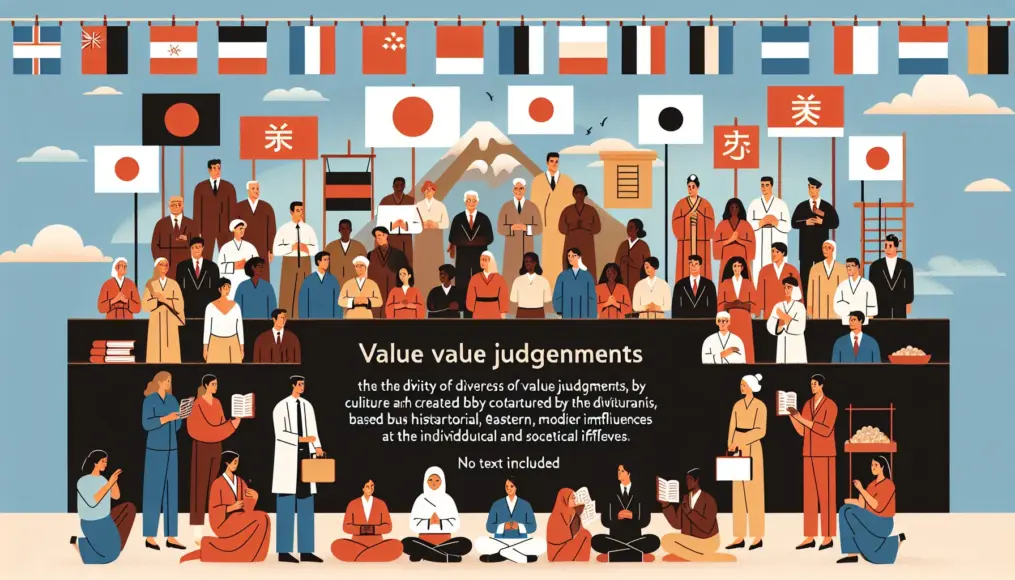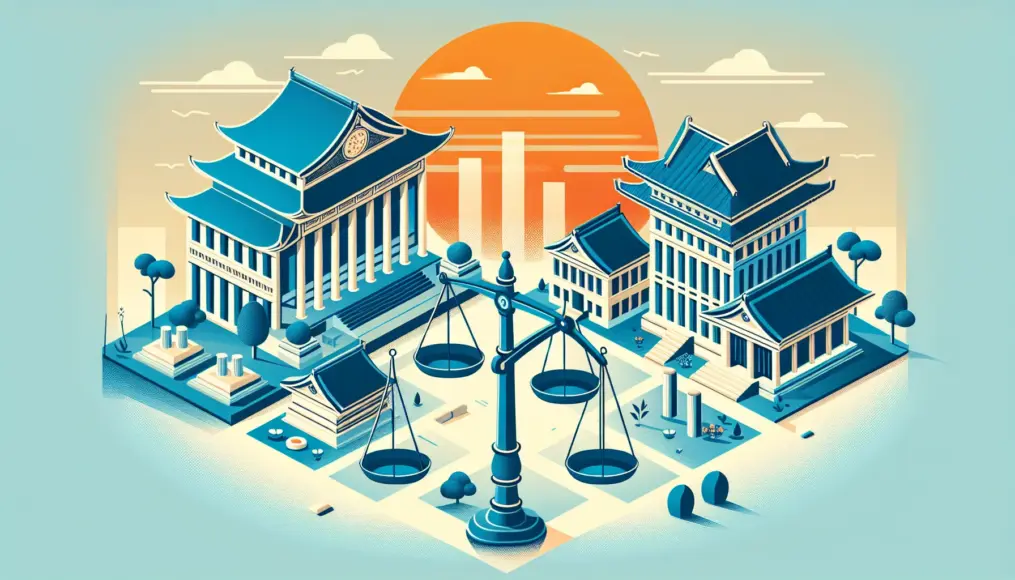Culture has a profound influence on our value judgments. The values that are deeply rooted in Japanese culture have been shaped over centuries of history. This evolution is significantly influenced by interactions with other countries and the changes within society. In this article, we will delve into the diversity of value judgments shaped by culture while reflecting on the contemporary challenges we face today.
As globalization and the rise of the digital age continue to unfold, how are our values shifting? The ethical dilemmas and social issues we encounter in our daily lives also play a major role in shaping our value judgments. Through these lenses, we will explore what the future holds for our perspectives on values.
- Investigating the Historical Background of Culture and Value Judgments
- Examining Changes in Values in the Modern Era
- Addressing Ethical Dilemmas and the Future of Value Judgments
The Historical Context of Culture and Value Judgments
Culture profoundly shapes our value judgments. In the case of Japanese culture, long-standing traditions and customs play a crucial role in forming contemporary values. This section delves into how values are cultivated within Japan and examines the differences in values compared to other countries. By understanding the cultural background, we can uncover how we make value judgments and engage with society.
The Formation of Values in Japanese Culture
Japan’s values have been shaped by a myriad of influences over its long history. From ancient Shinto and Buddhism to Confucianism, various religions and philosophies have intertwined to create a unique culture. Particularly noteworthy is the emphasis on harmony and the importance of living in sync with nature, which form the core of Japanese culture. These values significantly impact daily life and interpersonal relationships.
Moreover, Japan’s distinct values continue to evolve over time. Influences from Western culture following the Meiji Restoration and shifts in values due to post-war economic growth are just a few factors that have shaped the value judgments of the Japanese people. As a result, today’s values reflect a blend of historical traditions and new ideas, leading to greater diversity.
- Japanese culture has been shaped by a variety of influences
- The concept of harmony is deeply rooted
- Values have changed with the passage of time
Comparing Values with Other Countries
To truly understand Japanese values, it’s essential to compare them with those of other countries. For instance, while Western cultures prioritize individualism, Japanese culture is rooted in collectivism. This fundamental difference leads to significant variations in human relationships and societal structures. In Western contexts, self-assertion and personal growth are highly valued, often leading to a greater respect for individual freedom. Conversely, in Japan, harmony tends to take precedence, which can sometimes suppress individual opinions.
These differences in values also have implications in business, education, and everyday life. In Japan’s business environment, building long-term relationships and cooperation is emphasized, while Western cultures generally prioritize results-oriented approaches and efficiency. Understanding these value differences can facilitate smoother international interactions and communication.
- Japan is rooted in collectivism, while Western cultures embrace individualism
- Value systems in business contexts differ as well
- Understanding these differences can enhance international exchanges
Changing Value Judgments in Modern Times
In today’s society, our value judgments are undergoing significant transformations. The advancements in globalization and digitalization have ushered in an era where diverse perspectives intersect. As various cultures and ideologies blend, traditional values are being reassessed, and individual criteria for judgment are expanding. This chapter explores the impact of globalization and the diversification of values in a digital society.
The Impact of Globalization
Globalization has created a world where people and information flow freely across borders. This interconnectedness allows different cultures and values to influence one another, providing us with new perspectives on our value judgments. For instance, by embracing foreign cultures, our lifestyles and ways of thinking become richer, but this also leads to clashes with traditional values.
Moreover, as globalization progresses, there’s an increasing demand for a global perspective. This shift encourages individuals to embrace diversity in their value judgments. As we develop a better understanding of other cultures, a respect for differing viewpoints flourishes, enabling us to make decisions with a broader outlook.
- Different cultures are intersecting due to globalization
- Clashes with traditional values are occurring
- An international perspective is influencing value judgments
The Diversification of Values in the Digital Society
The rise of the digital age has profoundly impacted our value judgments. With social media and the internet, information spreads rapidly, providing us with more opportunities to encounter diverse opinions and values. In such an environment, individuals can easily discover their own values or gain new perspectives through conversations with others.
On the flip side, the overwhelming flow of information poses the risk of being swayed by misinformation or biased opinions. Therefore, it is crucial for us to carefully discern information and firmly establish our own value judgments. In a digital landscape, the ability to identify the truth has never been more essential.
If you’re intrigued by how modern value judgments have evolved, you might also enjoy this article: “Environmental Pollution and Its Philosophical Considerations.” This piece delves into how environmental issues influence our ethics and social values. Considering the philosophical aspects of environmental problems in today’s interconnected world is vital, as diverse values interact with one another.
- Opportunities to engage with diverse values have increased in the digital society
- The flood of information can lead to misguided judgments
- It’s important to maintain a firm grasp on one’s own value judgments
Ethical Dilemmas and Value Judgments
In our daily lives, we occasionally encounter ethical dilemmas—situations where we must navigate conflicting moral choices. These moments challenge us to determine which option is the “right” one, putting our values to the test. In this section, we will explore ethical dilemmas faced by individuals as well as the broader societal dilemmas that impact communities.
Personal Ethical Dilemmas
Personal ethical dilemmas often create a tug-of-war between our emotions, beliefs, and logical reasoning. For instance, when faced with a choice between a friend and a competitor, we might struggle to decide whether to prioritize our friendship or pursue success. Such situations provide a chance to reflect on how our values influence our decisions.
Moreover, our everyday lives are filled with scenarios where the distinction between right and wrong can be murky. For example, is it truly right to sacrifice our own interests to help others, or should self-preservation take precedence? We are constantly faced with these choices, and our value judgments play a significant role in our personal growth and relationships.
- Personal ethical dilemmas create conflicts between emotions and logic
- Choosing between friendship and success can be challenging
- Many situations blur the line between right and wrong
Societal Dilemmas and Their Impact
Societal dilemmas refer to situations where individual interests conflict with the greater good of society. A prime example can be found in environmental issues, where individuals may pursue short-term gains while society strives for sustainability. In such cases, how individuals make value judgments can significantly impact the community at large.
These societal dilemmas also manifest in politics, economics, and education. For instance, when resource allocation or policy decisions favor some individuals over others, it can lead to inequality and disadvantage for those left behind. In these scenarios, ethical considerations become crucial, and we must think about the sustainability of society as a whole.
- Societal dilemmas pit individual interests against the common good
- Environmental issues serve as a key example
- Ethical perspectives are vital in politics and economics
The Future of Value Judgment
Our value judgments are constantly evolving with the times. Particularly, advancements in technology and shifts in society are significant factors that will influence the values of future generations. In this chapter, we will explore the direction of values in the future and the impact they may have on society. By examining what values we hold and how we should act, we can contribute to building a better future.
The Direction of Next-Generation Values
Next-generation values are likely to be rooted in sustainability and empathy. As environmental issues and social inequalities become more pressing, future generations will respond to these challenges with increased sensitivity. For instance, the growing emphasis on ecology and ethical consumption will drive individuals and companies to make environmentally conscious choices.
Moreover, the evolution of technology is enhancing information transparency, which could further diversify our values. This increased clarity allows people from different backgrounds to find common ground more easily, fostering collaboration across society. Thus, we can expect the values of the next generation to evolve towards creating a more inclusive and sustainable society.
- Sustainability will be at the core of next-generation values
- Awareness of environmental issues will rise
- Technological transparency will enhance value diversity
The Impact of Value Judgment on Society
Value judgments can significantly influence the structure and culture of society. For example, the values held by individuals and organizations can shape policies and business models, ultimately determining the direction of society as a whole. Because of this, value judgment extends beyond personal choice; it becomes a crucial element with far-reaching implications.
Additionally, changes in value judgments often manifest as social movements or trends. For instance, many young people today prioritize social responsibility, prompting companies to bolster their community engagement initiatives in response to these expectations. It is clear that the way society is shaped by value judgments will be an important issue for future generations.
For those interested in a deeper understanding of the impact of value judgment on society, we recommend the article “Exploring the Economic and Social Impacts of Declining Birth Rates.” This piece delves into the changes in social structure and economic growth in Japan, where declining birth rates are becoming a pressing issue, so be sure to check it out.
- Value judgments influence policies and business models
- Young people’s awareness of social responsibility is growing
- Value judgments will shape the future direction of society
Conclusion
In this article, we explored the historical context of culture and value judgments, the evolution of these judgments in the modern world, the ethical dilemmas we face, and the potential direction of future values. It has become clear that globalization and the digital age have diversified our value judgments, significantly influencing both individual and societal behavior. Moreover, the values of the next generation are expected to emphasize sustainability and empathy, aiming to positively impact society as a whole.
By understanding how value judgments shape our choices and actions, we can gain valuable insights for building a better future. It’s crucial for us to observe how these judgments will continue to evolve in our society and to adapt to these changes ourselves.
- Value judgments are shaped by cultural and historical influences.
- Globalization and digitization bring diversity to value judgments.
- The values of the next generation are evolving towards a focus on sustainability and empathy.
Thank you for reading to the end. We’d love to hear your thoughts and opinions on value judgments in the comments!



Comment